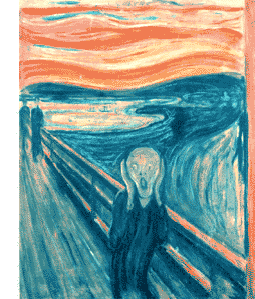
Whenever something does not go my way I tend to do what Albert Ellis, the famed behavioral psychologist, calls catastrophize. In other words, I freak out and immediately assume the very worst. I don’t usually show it, except to my wife, but it’s there as she can attest. I walk around the house like some giant Germanic Woody Allen….oy…oy…oy.
This recent hip whatever the hell it is has really had me tied in knots. I have been a good boy for two consecutive weeks and have not run, biked or raced. I even took one week off swimming. During this time I developed a condition I will refer to as Triathlangst.
In order to ease your next visit to a psychologist or psychiatrist below is the diagnostic criteria for Triathlangst:
A. The person has been exposed to an amazingly benign event in which all three of the following were present:
1) The person experienced some amazingly benign event that results in a constant nagging pain that can not be localized in any way that would be useful to a medical professional.
2) The person's response to the benign event involved intense feelings of helplessness, bitterness and horror at the fact that you have experienced wrecks on your bike that looked catastrophic but resulted in nothing more than a scrape whereas the benign event, such as stepping on a piece of paper, adjusting your jogging shorts or drying off wth a towel, has resulted almost complete incapacitition
3) The person was advised by friends, family and/or the medical profession to immedialy cease running, biking and swimming.
B. Either while experiencing or after experiencing the amazingly benign event, the individual has three (or more) of the following dissociative symptoms:
1) a subjective sense of numbing, detachment, or absence of emotional responsiveness
2) a reduction in awareness of his or her surroundings (e.g., "being in a daze")
3) derealization
4) depersonalization
5) dissociative amnesia (i.e., inability to recall an important aspect of the trauma)

C. The traumatic event is persistently reexperienced in at least one of the following ways: recurrent second guessing, kevtching, research into similar physical sensations that WILL NOT cause you to stop racing or training or a sense that being wildly optimistic and up beat will magically cause the negative sensations shooting through your body to immediatly dissipate.
D. Marked avoidance of people, books, magazine articles or physical sensations that arouse recollections that the amazingly benign event actually took place and that the pain you are experiencing is real.
E. Marked symptoms of anxiety or increased arousal (e.g., difficulty seeing other people excercise, irritability, poor concentration, hyper self-pity, exaggerated purchasing of triathlon gear, motor restlessness).
F. The Triathlangst causes clinically significant distress or impairment in your ability to relate to others without bitching about your injury and an inability to empathize with virtually anyone elses hardships because let's face it, your not racing.
G. The certainty that you have somehow magically ruined some major body part beyond all concievable hope becomes unbearale within 2 days and negotiations with your injury or ailment begin immediatly.


No, but I've had triathlanxiety. What if I get a flat? What about those hills? What if the water's too cold? What if it's windy? What about those hills? Etc., etc., etc...
ReplyDeleteLOL!!! That is just hysterical.
ReplyDeleteHope the angst leaves you soon.